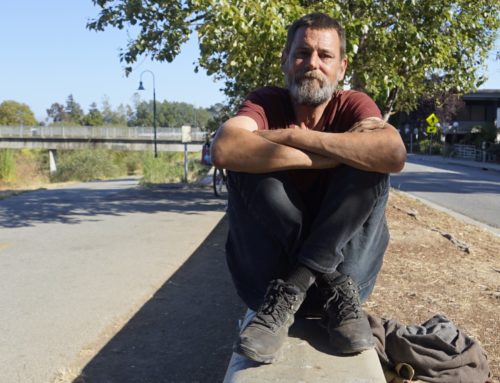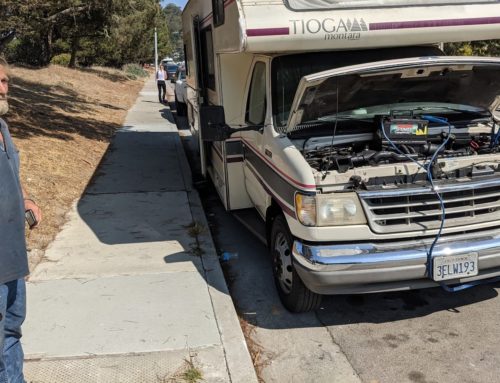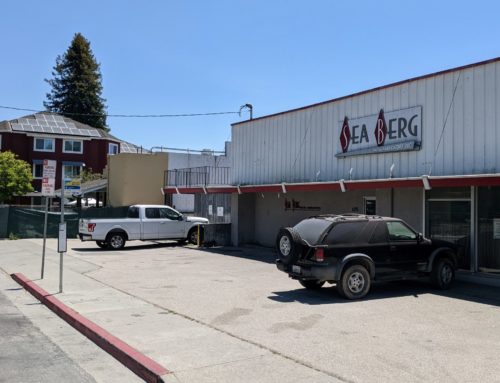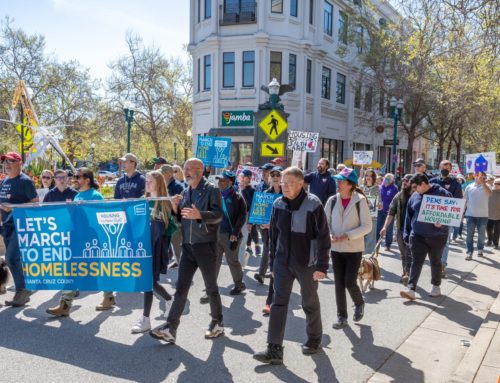In an online meeting Tuesday night, the Santa Cruz City Council will consider a proposed law that aims to prevent large homeless camps by limiting where and when people can camp and requiring most tents to be removed each morning. We explain the proposal. And we hear from three Santa Cruz residents who are homeless. We hear their stories: their goals, their barriers and their thoughts about the proposed law. Transcript below.
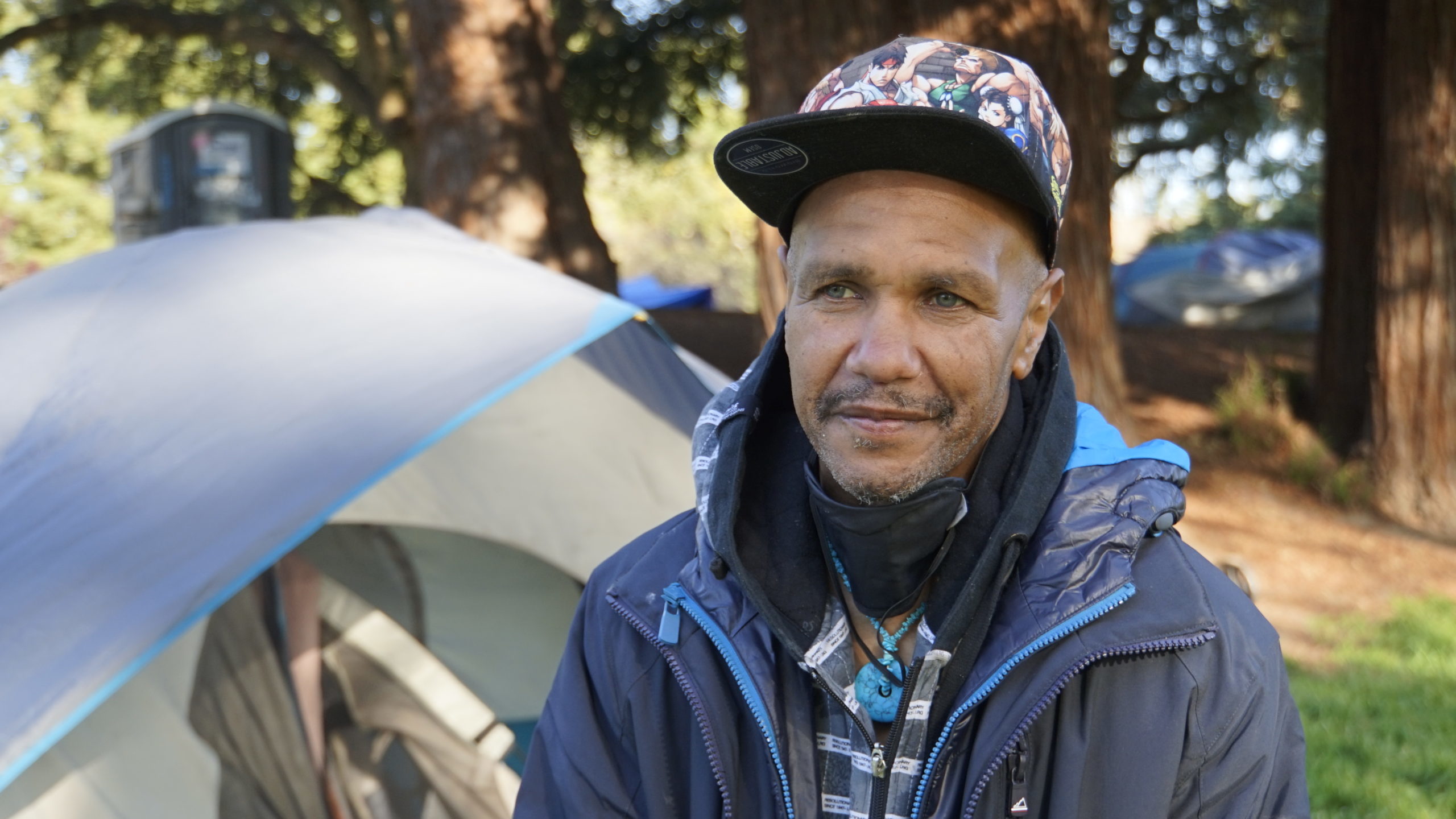
Santa Cruz Local resident Ashanti Craft has lived at a homeless camp at San Lorenzo Park in Santa Cruz in recent months. (Kara Meyberg Guzman — Santa Cruz Local)
Related links
- Santa Cruz city homeless rules to be reconsidered in April (March 10, 2021)
- Read the draft law
- Read residents’ emails on the proposal from March 21 to April 8 to the city council
- Read emails on the proposal from Feb. 15 to Feb. 22 to the city council
To participate
- Comment to the city council on the proposal: Email [email protected] by 5 p.m. Monday.
- Zoom link for the city council meeting 5:30 p.m. Tuesday
- Call into the meeting: 1-833-548-0276 and enter the meeting ID 946 8440 1344.
Transcript
Advertisement: Investing doesn’t have to be complicated. Talk to the experienced professionals at WI Investment Advisory Group. Visit them at 1535 Seabright Avenue, Suite 110 in Santa Cruz.
They are Registered Representatives and Investment Adviser Representatives with / and offer securities and advisory services through Commonwealth Financial Network, Member FINRA/SIPC, a Registered Investment Adviser.
WI Investment Advisory Group, Investing for What’s Important. wiiag dot com
[MUSIC]
Kara Meyberg Guzman: I’m Kara Meyberg Guzman.
This is Santa Cruz Local.
On Tuesday evening, the Santa Cruz City Council will consider a new law that regulates homeless camping. Basically, it limits where and when people are allowed to camp. Most people would be required to break down their tents each morning.
The law has taken shape in city council meetings over the past couple weeks. The council has heard from many people for and against. They’ve received more than 1,000 emails. They’ve heard from dozens of speakers. And based on what they’ve heard, they’ve adjusted the proposal.
But the council has not heard from very many homeless people about the proposal. Homeless people are arguably those most affected by the proposed law.
Because of the pandemic, the council meetings have been on Zoom. And they’re long. Residents can wait hours for the chance to comment. That can be a barrier to watch, let alone participate, for people who don’t have reliable WiFi, a digital device, or a place to charge that digital device.
Today, we’ll hear from three residents who are homeless. We’ll hear their stories: their goals, their barriers and their thoughts about the proposed law.
But first, here’s a quick summary of the proposal.
The law is meant to prevent large homeless camps. Camping would only be allowed at night. That’s defined as an hour before sunset to an hour after sunrise, but no later than 8 a.m.
Camping would only be allowed in areas zoned commercial or industrial, or in areas that the city has set aside for camping.
So, areas OK for camping would include Harvey West, the far Westside around the old Wrigley Building and the New Leaf market near the rail trail. It also would include areas along Mission, Ocean and Water streets, lower Pacific Avenue, Soquel Avenue and parts of Seabright Avenue.
That list is not comprehensive. There’s little pockets of commercial and industrial areas all over the city. We’ll post a map with the episode transcript, in the show notes.
The Santa Cruz City Council on April 13 will consider a proposal that would allow homeless camping on sidewalks in areas zoned I-G, IG(PER), I-G(PER2), C-C, C-N, C-T, CBD-E and PA.
In short, camping would not be allowed in residential areas, in open spaces like Arana Gulch and the Pogonip, in parks or downtown.
It is possible this could all change. The council narrowed the proposed camping areas last month. It was in response to pressure from residents who were concerned about camping in their neighborhoods. Many residents worry about safety and cleanliness in their neighborhoods.
And in the agenda report for Tuesday’s meeting, the city staff have listed options for how the council could change those proposed areas again. The council has continued to receive emails from residents concerned about camping in their neighborhoods.
The punishment for violators would start with a warning. Then police can issue tickets and $20 fines. After that, if the person refuses to move or they interfere with a camp closure, they could face arrest and be charged with a misdemeanor. Santa Cruz Police Chief Andy Mills has said those arrests are a “last resort.” He said that violators would not face jail time. The arrest allows police to take their property and store it.
The proposal also aims to give some support for the homeless. The proposal would create a managed homeless camp at 1220 River St. That’s in Harvey West. With round-the-clock staffing, that could cost the city more than $1 million a year, according to city staff.
The proposal also would create a storage program. That way people wouldn’t have to lug their stuff around town during the day. Estimated cost: $75,000.
It would also create an overnight safe sleeping program for at least 150 people. The idea is that homeless people could sleep in places like city-owned parking lots at night. They’d have to leave each morning. The location for the safe sleeping program has not been selected. Those kinds of programs could cost $750,000 a year, according to city staff.
The proposal was co-sponsored by Mayor Donna Meyers and Councilmembers Renee Golder and Martine Watkins. It’s been supported by Vice Mayor Sonja Brunner and Councilmember Shebreh Kalantari-Johnson. Councilmember Justin Cummings has supported parts of it but not all. And Councilmember Sandy Brown has consistently opposed it.
We’ll post our stories on the proposed law in the show notes. Those stories have more details and you can read residents’ views about why they support or oppose it.
[Sound of highway traffic, then ducks under]
KMG: I’m at Highway 1 and 9. It’s one of the busiest intersections in Santa Cruz. It’s also the site of one of the largest homeless camps in the city.
For months, the roadway has been lined with dozens of makeshift tents.
It’s Wednesday afternoon. It’s hot. It’s loud with cars.
I’m just off the highway shoulder. I’m crouching next to a tent, pointing my microphone at Tommy and Dave. They’re friends. Tommy’s in a folding chair.
Dave’s inside his tent. He lives here with his wife and dog. He pokes his head out to talk to me.
DAVE: We’re trying not to interfere or break laws and do stupid stuff. You know, we’re not trying to upset people you know, I mean, we’re really not. We’re people too, you know? And half of us are half crazy. And people don’t understand a lot of us. A lot of things, our views and stuff on stuff is the same as you guys. We just want to be able to survive, basically. You know, eat.
I’m not speaking for everybody because I don’t know. I’m just trying to say how I see it. I mean, I’m just happy if I’m just left the hell alone by yeah, like the cops or people trying to sweat my program. I’m not not trying to bother the business more than I am trying to bother him already by having all my [expletive] here. You know, I understand that, you know,
Most of us do want a place to live, you know?
KMG: Is that your goal? Are you trying to work towards getting a place to rent?
DAVE: I mean, I’ve been married 10 years you know, I’ve been out here for a long time you know, I’ve been out here [on the streets] for over half my life. I’m 52. I was born here too, in Santa Cruz. It’s a shame I can’t really get a place to live either, you know, but I don’t have much of an income and I’m too sick to work really. I can’t breathe, hardly. I smoke. I’ve been smoking for all my life and they won’t give me SSI. I can go on with my own problems. And I’m not complaining. I really ain’t complaining. I got nothing to complain about, really.
KMG: What’s the biggest barrier to you getting work?
DAVE: My health. My health right now. I just ain’t got the strength to work. The work that I know, that I’ve done all my life, it’s been labor. And I’m not fit for labor anymore. My lungs are damaged. And I’m 52, you know, and I’m like an 80 year old man out here, you know, on the street.
KMG: Dave and his friend Tommy didn’t want to give their last names. They said they were afraid of retribution from the police.
Tommy is just visiting at the camp. Tommy has been living in a nearby motel. He gets help from a state program that puts homeless people in motels during the pandemic.
Tommy tells me he gets hassled by people regularly for being homeless.
TOMMY: I get yelled at by people that didn’t even grow up here, to get out of their town. You know, I’m a vet. I spent six years in the Army, four on deployment, fighting for this country. And every day I get slapped in the face with why I shouldn’t have. Yeah, those people all — everybody on the city council and the county government needs to go back to the high school civics class and pay attention to what the Constitution is supposed to mean.
KMG: Tommy is 54. He was discharged from the Army in 1992. Then he worked as a mechanic. He told me he stopped working after he had open heart surgery.
His dream is to run his own business. He wants to build and sell motorized bikes. He has made some progress. He told me he built a bike, and sold it. He used that money to build two more bikes. It took him a couple years. Then, a few months ago, his tools were stolen.
I asked him what his plan is now.
TOMMY: You know, I got all my hopes in — at the motel, the governor told them that he wanted everybody that the state had housed in motels for the COVID thing, housed as they closed those places down. So I’m keeping both of my fingers and my toes crossed, and hoping that they follow through with that.
But having you know, even when I was working and had an apartment in the Jewel Box, I was aware that the treatment of the homeless in Santa Cruz is pathetic. It really is. For being in the richest country in the world and the richest state in that country.
Like the governor said at the beginning of the COVID thing, the way the homeless people are treated in this state is ridiculous. We all, every single citizen in California should be ashamed.
You know, we don’t want a hand out. But we also don’t want to keep getting shoved back into the dirt if we try and dig ourselves out.
KMG: Going back to the law that’s going to be considered, I’d love to hear what you want our city council to know.
TOMMY: Do the math.
DAVE: It’s impossible for people to pack up everything they own and move it here and there. Yeah, it just ain’t possible.
TOMMY: Yeah and that federal court order addressed that. They told them that making people move everything they own every single day was perpetuating homeless, and it was cruel and unusual treatment. You know, if there was housing for people to be in, you know, then you could come down on the people that are out on the street. But as long as there’s nowhere near enough shelter beds and low-income housing, then what do they expect?
KMG: Tommy’s talking about Martin vs. Boise. It’s a federal court case. The court decided that cities can’t prosecute homeless people for sleeping outside on public property if no shelter is available. It would be cruel and unusual punishment, the judge wrote.
City staff and the city attorney have said that the proposed law meets the requirements of the Martin vs. Boise decision. But the city attorney has said that if the council approves the proposal, the city would likely face a lawsuit.
TOMMY: You know, cause there’s — I know, I’m not the only one that’s from Santa Cruz and I ain’t going. I don’t care what laws they passed. I don’t care how many times they come around. Born and raised here. My kids were born here. I enlisted in the service. I went to school here. I’m not going nowhere. For them to just keep on pushing at me is ridiculous.
DAVE: It seems like it would be a good idea, if they’re gonna pass the laws, give us a spot at least. Like Harvey West, Pogonip or whatever. At least give us that area. I mean, it would make sense. It’s a lot easier to keep an eye on things if you’ve got everybody in the area. Instead of having everybody scattered. Why push us around?
KMG: Yeah. So the areas that the city council does want to make legal for camping is along Ocean, Water, Mission streets, Soquel [Avenue] —
TOMMY: Yeah, but they want you to pick up every morning and move all your stuff.
DAVE: They can’t do that.
TOMMY: But yet they want us to do the footwork to be able to get enrolled in these housing programs and stuff. You can’t do both. You can’t. There’s not enough time in the day.
DAVE: How can you do that and have a life? Any form of like sentimental stuff or values or anything? How can you expect somebody to pick up everything they own every morning and move their [expletive]. It’s just impossible. Come on, man.
TOMMY: What that’s gonna do is perpetuate people’s homelessness. Because how can you even go down and apply for your Social Security or even your Social Security card if you got to spend the morning picking up and packing up all your stuff, and then hauling it around from place to place? How are you supposed to even be able to eat when you got to deal with that every day? Even considering that law is a lunacy in itself. It makes absolutely no sense.
I mean, yeah. People shouldn’t be pitching tents on the middle, like on the sidewalk on Pacific Avenue. No. They shouldn’t. But the homeless problem in the country, it’s not just the county of Santa Cruz. It’s just the county of Santa Cruz thinks that they’re unique in their ignorance and their inability to and think of any way outside the box that they’ve stuck themselves into for the last 30 years.
DAVE: They need to look around and see what works in other places.
[MUSIC TRANSITION]
[SOUND OF BIRDS AT SAN LORENZO PARK]
KMG: Next I went to San Lorenzo Park in Santa Cruz. Another large homeless camp has been there for months.Tents circle the duck pond and line the area along the lawn bowling courts. Someone lives on the duck island stage too, under a tarp. A man lives there with his chihuahua and a chicken.
For years, city leaders have struggled to manage unsanctioned homeless camping along the San Lorenzo River. At the end of last year, city officials attempted to clear the homeless camp at San Lorenzo Park. There were protests. Then a federal judge temporarily prevented city officials from clearing the camp.
I met Ashanti Craft on the benchlands along the San Lorenzo River. That’s where Ashanti pitched his tent, on the outskirts of the camp. He was in the grass, feeding the ducks.
ASHANTI CRAFT: I’ve been doing this for so long. You know, I’ve been on the streets since I was like 15 years old. I’m 51 now.
KMG: Wow. Really, without a break? You’ve been homeless since you were 15?
ASHANTI CRAFT: Yeah, without a break unless I was in prison or jail. That was a long time ago. I’m 51 now. I retired that stuff a long time ago. I was married. I had kids. Actually it was like a four-year break when I was married with kids in Maine, you know?
But I came back here and it was still the same thing. What kept me out of trouble when I got back here, what kept me out of jail, what kept me out of prison when I came back here, what stopped me from doing that stuff, was recycling. Yep, exactly.
KMG: What do you mean recycling?
ASHANTI CRAFT: I used to ride around here on my bicycle with like five or six big ol’ garbage bags full of cans and bottles.You know, steadying my bicycle, you know. Every morning. Every day. For seven days a week. That’s how I supported myself. That’s how I did everything.
And then they shut it down. Ridiculous.
KMG: You’re talking about the recycling center in Harvey West?
ASHANTI CRAFT: By Costco, yeah.
KMG: It’s not open anymore?
ASHANTI CRAFT: It’s been closed about two years.
KMG: How do you support yourself now?
ASHANTI CRAFT: Now [stutters] I support myself basically through means that are not, not very conducive to how I would really like to live, you know what I mean?
But I do whatever I — I do odd jobs here and there. The occasional run.
Nobody grows up and says I want to do that. We were really good kids. Everybody wanted to be the policeman. But then you get disillusioned. By watching TV and watching the news, and watching all the police treat these people. Step on people’s necks and the things that they do. And they seem to get away with it with impunity. I think that pretty much is a major thing for me.
KMG: What is your dream? Like, what would you want? Do you want to get back to work or do you want to get an apartment?
ASHANTI CRAFT: There is no ‘get back to work’ with me, you know? Somebody gave me crack when I was 12 years old. I’ve been smoking weed since I was 4. I was doing crack since I was 12. Fifteen years old, I was a crack head, out here on the streets with the adults.
Like I said, it was the culture. I had a lot of friends, you know. So that’s what we did.
So I never really had much of a — So here was my dream, I want to have a pound of this, and a kilo of that. That was my dream as a kid, OK? I mean, that was just ridiculous.
It took a long time for me to grow out of that because that was all I knew.
KMG: Ashanti grew up in Santa Cruz and lived here most of his life. He has three kids. All adults now. He told me he’s glad his kids were not raised in Santa Cruz. The drug scene might have been in their face as teenagers, as it was for him, he told me.
In his 20s, Ashanti went to San Quentin State Prison for selling drugs. Shortly after, he went to jail in Santa Cruz for petty theft. And again, for making a criminal threat.
Ashanti has dozens of cases on his court record. Most of the cases are traffic tickets, for things like trespassing and setting up bedding in a prohibited area.
He’s gone to jail more than once for property crime.
I asked Ashanti what he thought about the proposal to limit homeless camping in Santa Cruz and bring back a managed homeless camp at 1220 River St. He stayed at the previous camp there before the city shut it down.
ASHANTI CRAFT: That, I thought was cool. I liked that. Some people have problems with having to be bused in and out. People want to be able to go and come as a please. But we’re in a busy area you know. And people come to invest money. You can’t have homeless people out there drinking bottles and that kind of stuff, and trash. So I understood that. I thought that was a great spot. I like how they ran it. I thought it was good. I really did.
KMG: OK. And you’d like to see another one?
ASHANTI CRAFT: Yeah. Without a doubt.
I think they need to maybe give us tents that are able to house like 10 people at a time, you know what I mean? Maybe it’s bunk beds, instead of one tent per person. Instead you get more space and everything.
And I don’t know what they’re going to do, in between 8 a.m. and 8 p.m., where do they expect everyone to go? We’re all going to be downtown, begging for change, it’s ridiculous.
We need more job opportunities down here. And I think we need more one-on-one counseling with people. So they can try to help certain people who want to get out of their situation, get out.
KMG: What kind of help or services do you want or need?
ASHANTI CRAFT: What do I need? I need housing.
I’d like to maybe get disability. I got ran over by a train three years ago.
KMG: Oh. Here in Santa Cruz?
ASHANTI CRAFT: In Harvey West. I was underneath the train like this — boom, boom — for 30 seconds. The only way I survived was through the will of God, as far as I’m concerned. Because I thought I was doomed, you know?
I was walking along and I crossed the tracks. I was bumping to some music in my head. And then “Ashanti!” and I was like “What?” and I turned around and it was like [vroom.]
I thought, the dumbest way to die. You’re gonna be on TV, that was my first thought. BAM. I backed up like this. I tripped over. I went down, I seen it coming. I was like, man. I curled up, I prepared to die and he hit me. And he pushed me forward. He went over me, and I was like oh my god. It hit the top of my toes and it was like boom.
KMG: What?
ASHANTI CRAFT: Yeah.
KMG: What broke?
ASHANTI CRAFT: The train.
[Laughs]
I didn’t break anything.
KMG: Oh, but you needed medical care?
ASHANTI CRAFT: Yeah, my back was all scraped up. My spine gives out sometimes. I know what it’s like to feel completely horrible. Because sometimes it gives out and you cannot — you can’t move. So I’m trying to get disability for my back. During the pandemic, I couldn’t get no appointment. I got no stimulus. I got nothing. They didn’t give me nothing. Probably because I don’t have the proper paperwork and stuff like that to do what I need to do. I just went down and got a copy of my ID card yesterday. So I’m trying to take care of that.
KMG: Is there anything else that you’d want our city council to know?
ASHANTI CRAFT: Yeah. I’d like the city council to know that nobody wants to be out here. We don’t choose to be out here. We didn’t choose this lifestyle. But it’s here. It’s what we do, you know?
[INTERLUDE]
KMG: To comment to the city council on the proposed law, email [email protected] by 5 p.m. Monday. We’ll post the Zoom link for the meeting in the show notes, in case you want to watch or speak at the meeting. The item is scheduled for 5:30 p.m. Tuesday.
Public comment is limited to 75 minutes, and one minute per person, according to the agenda.
You can also call into the meeting to comment. Call 1-833-548-0276 and enter the meeting ID 946 8440 1344.
[OUTRO MUSIC]
KMG: Thank you to our Santa Cruz Local members. Our members allow our work to be free for all.
Thank you especially to our highest-level members:
- Elizabeth and David Doolin
- Fran Goodwin
- Debra Szeicei
- Chris Neklason
- Patrick Reilly
- Elena Cohen and Steve Ritz
Become a member and support local news at santacruzlocal DOT org SLASH membership.
And. If you’re not on our email newsletter yet, it’s time to join. That’s where you can learn more about what’s happening in local government and how to make your voice heard. We’re in your inbox two to three times a week. Sign up link is in the show notes.
Thanks to Trimpot for the music.
I’m Kara Meyberg Guzman.
Thanks for listening to Santa Cruz Local.
Kara Meyberg Guzman is the CEO and co-founder of Santa Cruz Local. Prior to Santa Cruz Local, she served as the Santa Cruz Sentinel’s managing editor. She has a biology degree from Stanford University and lives in Santa Cruz.


